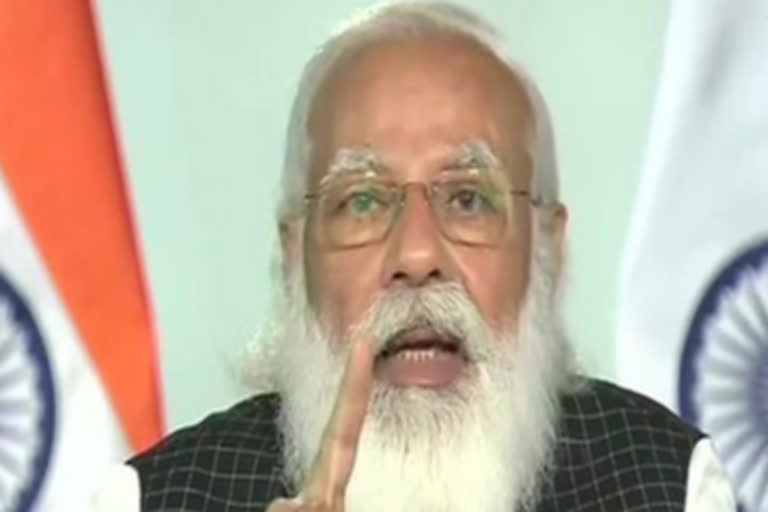New Delhi: In his first meeting with chief ministers after the start of the second Covid wave that hit the country in March-April, Prime Minister Narendra Modi emphasised on the old method of testing, tracking and treating the patients to contain the further spread of the deadly virus, adding that with the availability of vaccine the focus was shifted away from testing.
“It is clear from the presentation made by the health secretary that the country has crossed the peak witnessed during the first wave. Some states like Maharashtra, Punjab, Chhattisgarh and others have seen a sharp rise in the cases. It is a cause of serious concern,” Prime Minister Modi told state chief ministers in a meeting held through a video link.
Prime Minister Narendra Modi blamed the Covid fatigue, which has set in, both in the people and administration, for the second wave, which has been spreading faster than the first wave.
“This time the people have become casual. In most of the States, the administration also appears to be lax,” he told the chief ministers adding that it was a test of the governments’ ability to contain the further spread of the deadly virus.
“Once again we have to work on war footing to stop the spread of the coronavirus. We have better resources, we are better prepared to deal with the situation and now we have a vaccine too,” said the Prime Minister while urging the chief ministers to once again galvanise in the country’s fight against the disease.
“Last time, we showed it by bringing down the active cases to below 1.25 lakh cases. Experience suggests that testing, tracking and treatment are effective,” he told chief ministers.
The Prime Minister said families after families were getting infected as corona infected asymptomatic family members continued to live with other health family members in absence of proactive testing and it was already late to help the family by the time symptoms appeared and a test was conducted.
“That is why our focus should be more on testing rather than vaccines. The only way to contain the virus is to contain the human host,” explained the Prime Minister.
Prime Minister Modi said testing and tracking should not be taken lightly and states should not be afraid of conducting more tests to avoid criticism or negative publicity.
States should not be under pressure to show low infection rate by cutting down the tests, said the Prime Minister. “We must be able to track at least 30 contacts of an infected person within 72 hours.”
No politics
The Prime Minister also advised chief ministers to rise above the party politics in the country’s fight against the virus.
His remarks come in the wake of the accusation by Maharashtra health minister Rajesh Tope who blamed the alarming rise in the cases in the state to low vaccine allocation by the Centre, a charge which was rebutted by Union health minister Dr Harsh Vardhan.
“From day one I have experienced politics but I never open my mouth. We have been given the sacred responsibility of serving the people. People who want to do politics, they are doing it and will continue to do so,” he told chief ministers.
Proper sample collection
Prime Minister Modi also questioned the way samples are collected for RT-PCR tests, saying that the sample should be taken from deep inside the throat and not from the outer part of the mouth.
“Improper sampling will fail to detect the virus,” he told states.
He also suggested that at least 70% of the total tests conducted by States should be RT-PCR tests, which is considered gold-standard in detecting the infection.
Prime Minister Modi said now the country was better prepared to tackle the second Covid wave as it had the experience of controlling the virus during the first wave when there were not enough testing facilities or equipment to deal with the virus such as masks, sanitisers and PPE kits.
“At that time we had only one option to impose a lockdown,” he observed.
Well defined micro-containment zones
